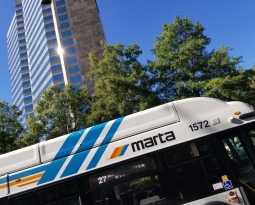The Way Back to the Workplace: Parking Pricing
 Today: Parking Pricing
Today: Parking Pricing
This one is more for employers and property managers, but for those uninitiated into the land use quandary that is parking, the logic here might be illuminating. The long and the short of it is there’s not enough land under your workplace’s control for everyone to drive and park every day. Of course we’re assuming everyone’s driving alone [and most people do], and that workplaces are leased up – in fact, the recent trend has been to pack a greater number of employees into the same amount of space; although we’re likely to about-face on that trend in the wake of COVID. Land is scarce (they’re not making any more of the stuff) and parking decks are shockingly expensive. Organizations like Livable Buckhead do our best to help create slack in that parking demand by offering alternatives, but the best way to keep parking available is to charge for it – and after all that’s only fair since it’s finite and it costs something to build and maintain.
- Change the Pricing Model: Offer daily passes, rather than monthly passes to encourage
employees to rethink how often they drive, which can reduce drive-alone rates and increase
parking availability. Offer variable pricing by time of day that reduces the number of people
commuting at the same time. - Prioritize Parking for Carpools/Vanpools: Create and incentivize dedicated parking spaces
for carpoolers and vanpoolers to reduce overall demand on parking supply. - Support Active Transportation: Increase the availability of parking for bikes and scooters.
Work with your local government to create or improve nearby sidewalks to provide better
access to your facility. - Offer Parking Cash-Out: Incentivize employees to use other commuting options that may be
available to them by providing cash in lieu of a parking pass. “Parking cash-out program” means an employer-funded program, under which an employer offers to provide a cash allowance to an employee equivalent to the parking subsidy that the employer would otherwise pay to provide the employee with a parking space. - Reassign or Reserve Parking: Turn parking spaces previously used by employees who can
telework at least part-time into parking for employees who carpool/vanpool. - Eliminate Contact Payment: Implement no contact payment solutions.
- Flex Your Working Hours: Employers should shift their work schedule to spread out demand for
shared parking resources.
In future installments I’ll discuss:
- Telecommuting
And see my previous posts on Carpooling and Public Transit.







